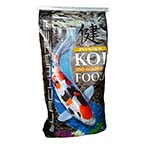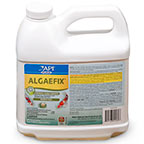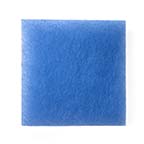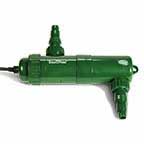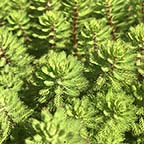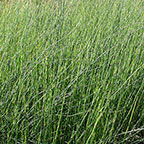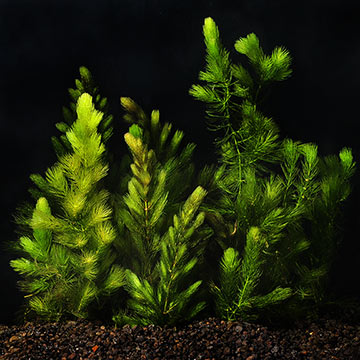
Additional locales and sizes may be available!
Additional locales and sizes may be available! Email me when available|
Product Notes:
· We cannot ship this product to California. |
Quick Stats
What do these Quick Stats mean? Click here for more information
What do these Quick Stats mean? Click here for more information
Overview
The Hornwort Plant, also known as Coontail, is an attractive aquatic plant popular among freshwater aquarium hobbyists as well as pond keepers and water gardeners thanks to its undemanding care requirements and vigorous growth. The semi-translucent nature of the Hornwort Plant enhances its beautiful vibrant green coloration. In fact, under bright light and in clear water, the Hornwort Plant appears to be enveloped in a gorgeous green glow.
In addition to its aesthetic value, the Hornwort Plant is highly prized among pond keepers as it plays an important role in improving pond water quality and water clarity. The Hornwort Plant is a fantastic oxygenating plant that efficiently processes dissolved carbon dioxide, converting it into oxygen vital to goldfish, koi, and other pond fish. In addition to oxygenating pondwater, the Hornwort Plant excels at consuming nitrogenous waste materials that is not only toxic to pond fish but can also fuel aggressive nuisance algae growth. To top it off, the Hornwort Plant emits a plant hormone that can inhibit the growth of blue-green algae, making it a fantastic natural remedy for common pond water quality and clarity issues.
The Hornwort Plant should be handled with care when planting as the foliage and stems are somewhat brittle. In the wild, the Hornwort Plant is found free-floating in gently-moving and still waters or loosely anchored in muddy bottoms. For the home pond or water garden, the Hornwort Plant can be treated as a floating plant or potted in small aquatic planters or planted directly in gravel on the pond bottom. Once established, the Hornwort Plant grows quickly to provide much needed shade and protection for your pond fish, as well as a potential spawning site for fish. Under ideal conditions, the Hornwort Plant can produce stems 24" in length or longer with numerous side shoots. Cuttings removed from healthy mature plants can be replanted to help manage growth and to propagate new plants.
In temperate areas where the pond water temperatures begin to fall, the tips of the Hornwort Plant will shorten and thicken before falling off and settling on the pond floor to spend the winter as buds. In spring, these buds grow to repopulate the pond.
The Hornwort Plant (Dozen) includes 12 bunches containing 5 to 7 individual Hornwort plants. Zones 4-11.
Approximate Purchase Size: 6" to 8"




